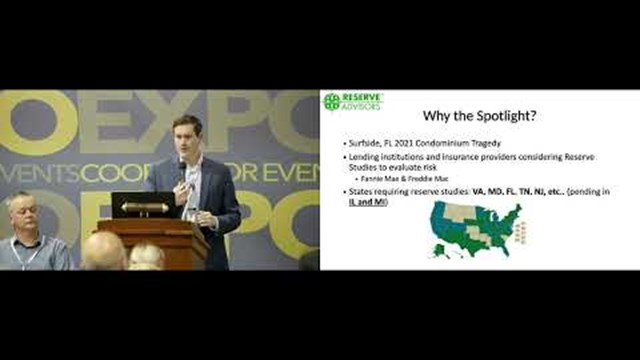It’s an all-too-common habit among many condo and HOA board members: assuming that their treasurer or property manager is keeping a close eye on their community’s financial information, they don’t bother familiarizing themselves with their building or association’s accounts payable and receivable, its budget, or the state of its reserve funds. This is a mistake. All board members have a fiduciary responsibility to the residents they serve—and a big part of that duty is having a solid grasp of their community’s financial information. Below are some tips to help both new and veteran board members do just that.
An Active Board is Key
Hands down, the most important component for a successful and financially healthy association is an active and involved board. The entire board is responsible for a community’s financial information—not just the treasurer or the property manager. A detached, uninformed board often leads to one or more members putting their own interests and agenda ahead of what’s in the best interest of the association. In some cases, this lack of oversight can even open the door to outright fraud. Since the entire board is responsible for the financial information, it’s incumbent on all board members to review, understand, and critically assess their association’s monthly financial statements for irregularities and other red flags that could indicate problems.
Budget Preparation
Every association needs to have a budget—which is the plan for the current year—and a reserve study, which is a strategic plan for the future. The budgeting process should involve not just the property manager and treasurer, but the entire board giving input on each budgeted line item. These items are generally divided into mandatory line items and discretionary line items, with the board deciding as a body whether they can afford all or just some of the discretionary items.
Before the board can make final discretionary line item decisions, they must assess how much they need to fund the community’s reserves each year. By reviewing their most recent reserve study, the board can determine what major expenditures will need to be funded within the next five years or so. New reserve studies should be conducted every three to five years, since costs for major capital projects can fluctuate substantially within that time frame. Up-to-date reserve studies enable a board to plan for large upcoming expenses well ahead of need, and to not have to borrow from a financial institution or special assess units owners to cover costs.
Comingling of Funds
A board that’s checked-out when it comes to overseeing finances is also setting itself up for trouble if members aren’t reviewing what should be paid or received by their operating and reserve funds, respectively.
Every month, boards should closely review their community’s bank and investment statements and reconciliations. If there are transfers between bank or investment accounts, it’s important to make sure the transfers taken out of one account did in fact clear into the other account. Boards should review their reserve cash account to verify that the budgeted reserve contributions have been deposited into the reserve cash account. They should also confirm that if reserve expenses were paid out of the operating cash account, the operating cash account was reimbursed from the reserves for the exact amount of the expenditure - not an estimated amount. Sometimes transfers were never actually made so they are outstanding in your bank and investment accounts, or the funds were transferred to an account that is not your association’s account. If the deposit did not clear the other account, inquire why it is still outstanding.
Investment Policy
Part of a board’s financial responsibility to their constituents is to prudently manage the community’s reserves—so every board should have an investment policy. This policy should state the financial goals of the association, which should include funding reserves, and avoiding—or at least minimizing—special assessments or loans. It should state the investment priorities, which are safety, liquidity and yield. It should also discuss the criteria for selecting the investments and the procedures for reviewing and controlling them. One key item that should also be part of the policy is specifically naming the signers on the cash and investment accounts. All too often, new board members are elected, and have no idea who the signers on the accounts are, since many of the accounts were set up years, or even decades ago. The board should be signers on all reserve cash and investment accounts.
End-of-Year Operating Fund Surplus
Many boards don’t realize that if their association has excess operating funds at the end of the fiscal year, they may have some options of what to do with this leftover money. To determine what those options are, first take a look at your bylaws and declaration to see if those documents offer any guidance on what can or should be done with any excess operating funds. Then, see if your state has any requirements. If it doesn’t, the board can elect to keep these excess funds in the operating fund, transfer them to their reserve fund, refund the excess to the owners, or transfer the excess to an operating contingency fund. The operating contingency fund can be used for any unexpected operating fund expenses in the next or future years. If your association files an IRS form 1120 instead of an IRS form 120-H, the association can file a 70-604 election, which states what to do with these excess operating funds for income tax purposes.
Review the General Ledger
Your general ledger is one of your most important financial reports, because it shows the expenditures and receipts by account each month, in detail. Reviewing the accounts in the general ledger will determine whether the receipts and expenditures have been classified correctly. Boards should review any large reserve expenditure to verify that these have been approved by the board, and to make sure that any change orders have been approved by the board. Also, the association’s balance sheet accounts should also be reviewed to make sure they agree with your financial reports.
Review Your CPA’s Year-End Statements
Most associations should have an annual CPA-prepared financial statement—usually a compilation, review or audit. Your bylaws and declaration may mandate that such a statement is produced each year. Also review your state’s requirements, as well as any loan agreements from your financial institution.
As part of your board’s financial fiduciary duty, it is always good to have a third-party financial statement. These statements should be based on generally accepted accounting principles (GAAP). A GAAP financial statement is drafted on the accrual basis, which shows your actual financial position, and includes a balance sheet, income and expense statement, cash flow statement, and footnote disclosures. These financial statements should be drawn up on a fund accounting basis rather than a commercial accounting basis, so the board can see the activity and financial position of each fund. These CPA prepared statements will show the amount due to and from each fund, and provide more information to both current owners and future owners who want to see GAAP financial statements in order to accurately understand the association’s actual financial position.
Income Taxes
Most associations are required to file an income tax return, either IRS form 1120-H or form 1120. Certain states also require a state income tax return. The board is responsible for the tax returns, so they should make sure they are reviewed, signed, and filed correctly and on time.
Running a building or association is a big job with a lot of moving parts, and boards have a great deal on their plate. While financial administration might not seem as urgent as a heated dispute between neighbors or a leaky clubhouse roof, it’s a crucial component of the board’s fiduciary duty to their community. Educating yourself and your fellow board members about the financial health of your association, and taking an active interest in maintaining and improving it will help your community be a successful, solvent place where both current and future residents want to live.
Steven Silberman is a Certified Public Accountant and partner with PBG Financial Services, PLLC, based in Northbrook, Illinois and serving the greater Chicagoland area.










Leave a Comment